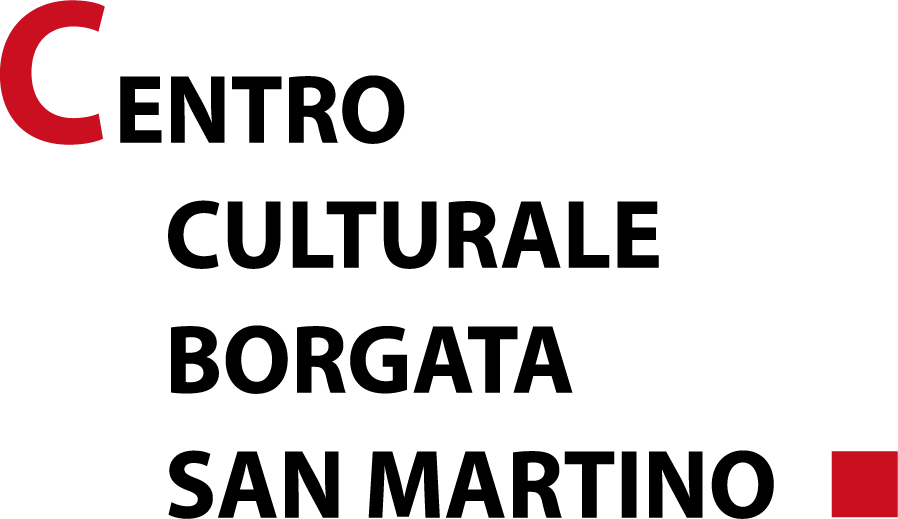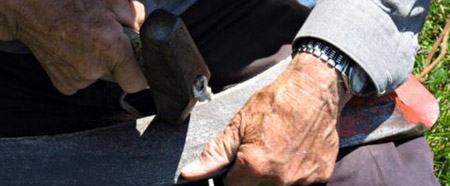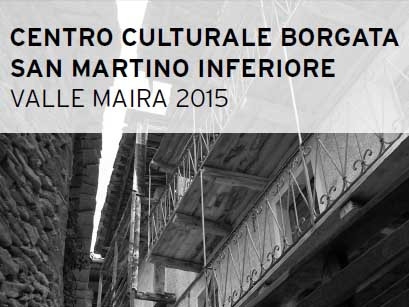About us
San Martino Inferiore is located at the end of a small country road on the southern slope of the Maira Valley in 1400 m. There, some old cottages have been perceptively restored and reconstructed according to their new function. On the surrounding meadows and fields there are plenty of places to enjoy oneself and relax. Lots of mule paths invite to walks, hiking trips or excursions onto the higher mountains. The mountain church in Elva, one of the eight most attractive culture monuments in Piedmont, the Romanic church San Peyre and the medieval “Ospedale di Caudano” can be reached on foot. In the further surroundings there are the towns Saluzzo and Cuneo, the famous castle of Manta and Italy`s most renowned vine- and culinary-area, the Langhe.
The Centro Culturale Borgata offers courses, organizes exhibitions, small concerts, conferences and ecological weeks. San Martino is a meeting place for people from urban and rural areas.
On 7th March, 2004 Andrea Schneider from the Centro Culturale died at the age of 53 during the stay at a health resort in the Allgäu. Together with his wife Maria, he has done a lot for the revival of the alps and for a sustainable tourism in the Maira Valley. Maria Schneider, who had continued the work at San Martino in the usual manner, died in February 2022 after a severe illness. Since 2021 Paola Bivio has leased the Centro Culturale and continues to run it in the style of the founders.
In November 2006, the “Kleine Binding Preis für Natur- und Umweltschutz” (a prize for conserving nature and environment) was awarded to Maria and Andrea Schneider at Vaduz in Liechtenstein and in 2022 postum the “Bandiera Verde” of the Legambiente.
Due to frequent requests you have the possibility to make reservations in almost all of the Posti Tappa using the form on our website. In the latest edition of the guidebook “Antipasti und Alte Wege” by Bauer and Frischknecht, you find a complete list of all accommodations.
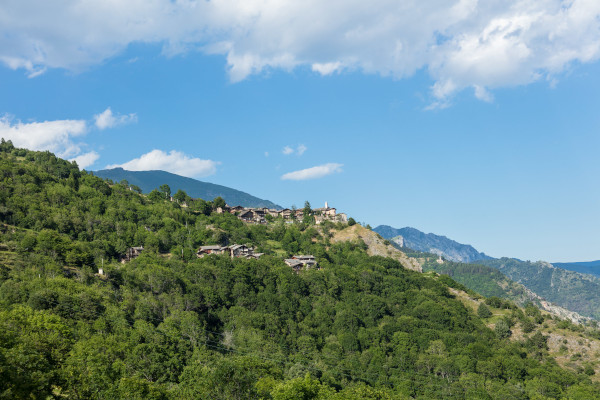
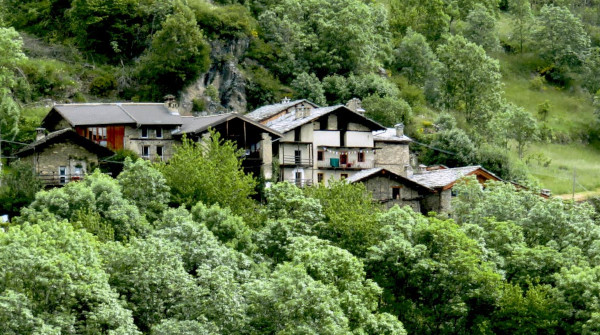
Restaurant
The restaurant „Borgata San Martino“ is open from 1st may to October 31th every evening.
Lunch is served on request.
The lunch as well as the dinner is a set menu (“menu fisso”).
Beside the “normal” menu we offer, on request, also a vegetarian menu.
We also take into account food intolerances and allergies when preparing our menu.
Due to the remote location and the great demand it is necessary to make a reservation.
The philosophy of the kitchen is to use local products. Most of the salad and vegetables are from our own garden and small local growers.
Cheese is obtained by the many cheese dairies nearby.
We serve Piedmont wines to our 5-course-dinner.
Wine tastings and excursions to the nearby Langhe can be organised.
Trained and friendly staff helps you selecting suitable wines for the dinner.
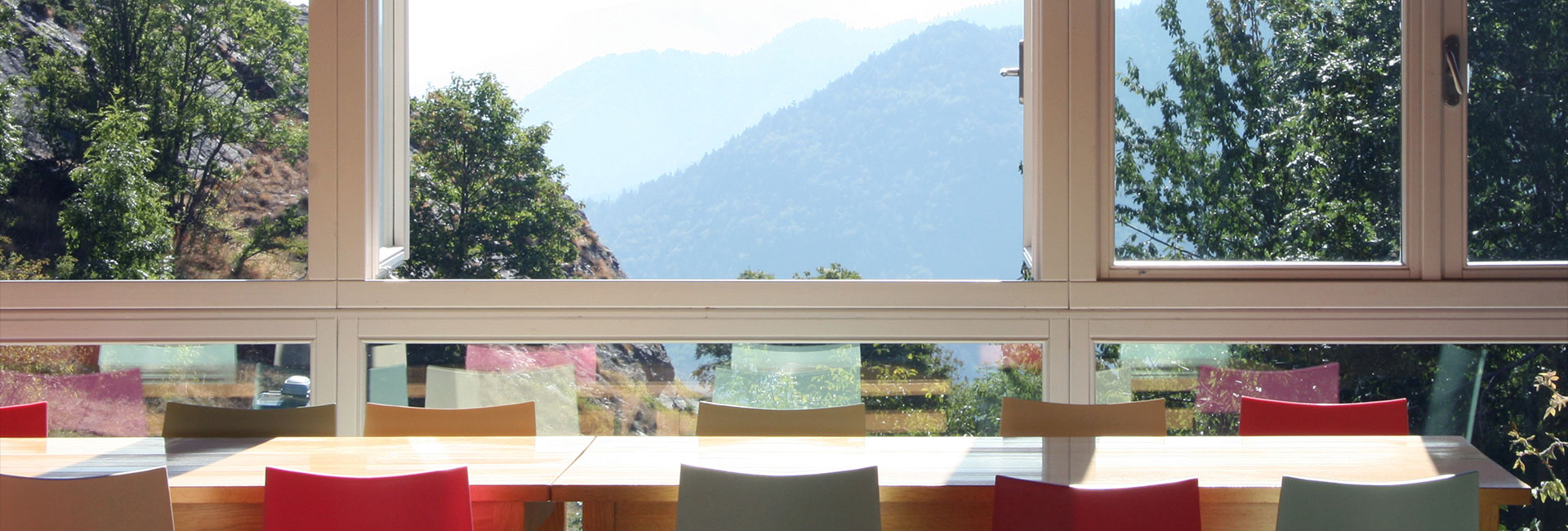
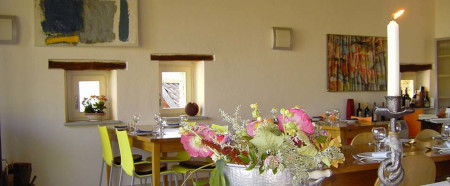
History
More than 32 years ago Andrea and Maria Schneider came for the first time to the the Maira Valley.
They were greeted with the words: You are the first Germans that we see here since the war…
This statement has never prevented them to establish contact to the local people, to come to know history and stories and to follow their idea of a sustainable and environmentally-sensitive tourism.
In collaboration with small local hotels they managed over the years to interest more and more foreign tourists into the remote and unknown valley. Since that time many things have changed.
Andrea Schneider died already in 2004, Maria Schneider in 2022, thanks to its collaborators the Centro Culturale has become a well-known and popular place. But one thing is still the same: the principle and the philosophy of walking slowly and mindfully, to move around in the mountains without devices, moving forward meter by meter paying attention to one’s own breath.
It is a wonderful experience to hike up a mountain of 3000 meter in one’s own rhythm and to be conscious of every single step.
A toddler’s joy and pride when it stands up and does it’s first steps without help is comparable with the hiking in high mountains for adults. When we are moving attentivly in the nature we are enjoying luxury goods that do not exist anymore in our everyday life, such as walking slowly in the nature, the differentiated scenting of fresh herbs, the wonderful colours of the autumn foliage, the enjoying of fresh spring water…
Interview
Maria and Andrea Schneider: „We have been lucky“
How do a woman from Cologne (Germany) and a man from Voralberg (Austria) come into the Maira Valley of all places?
Andrea: By chance. On a trip to the Provence I went by night erroneously into the Maira Valley and in the morning I found myself in a very romantic valley. That was in 1978 or 1979. After that we came here several times on vacation. Back than we had a boutique and imported embroidered dresses, silver jewelry and other things from Afghanistan. Originally I come from the mountains and I have always had the wish to live in the mountains again one day. In Florence I attended an Italian class and spent almost the entire winter 1981/82 in the valley to find out what one could do there. Then I had the idea of a language school because I met some unemployed teachers on the carnival party in Prazzo. I did not like Florence and I thought that a language school like there was missing in the mountains.
Maria: We have been unbelievably lucky. It was the time…
(Source: Antipasti und alte Wege. Valle Maira – Wandern im anderen Piemont, 5th edition, 2004)
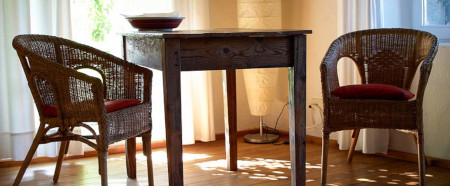
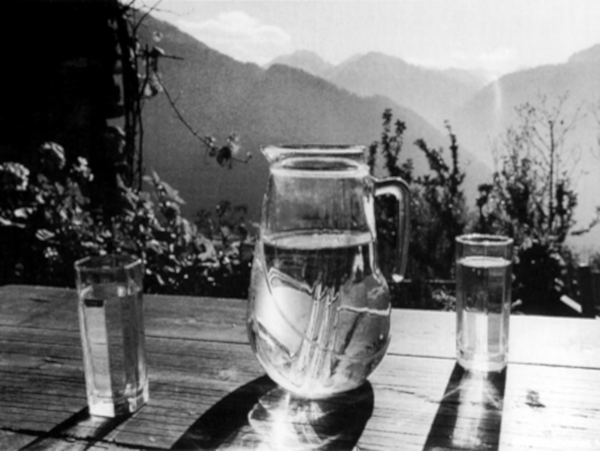
... continue reading
Maria and Andrea Schneider: „We have been lucky“
How do a woman from Cologne (Germany) and a man from Voralberg (Austria) come into the Maira Valley of all places?
Andrea: By chance. On a trip to the Provence I went by night erroneously into the Maira Valley and in the morning I found myself in a very romantic valley. That was in 1978 or 1979. After that we came here several times on vacation. Back than we had a boutique and imported embroidered dresses, silver jewelry and other things from Afghanistan. Originally I come from the mountains and I have always had the wish to live in the mountains again one day. In Florence I attended an Italian class and spent almost the entire winter 1981/82 in the valley to find out what one could do there. Then I had the idea of a language school because I met some unemployed teachers on the carnival party in Prazzo. I did not like Florence and I thought that a language school like there was missing in the mountains.
Maria: We have been unbelievably lucky. It was the time of the great demand for alternative language schools. Owing to only one small ad in the newspaper “taz” already eight or ten people came to our first course in May 1982. At the beginning I continued to work in Cologne as a precaution and did the bookings. Andrea was working – with a minimal knowledge of the Italian language – at Prazzo, together with the teachers and the friends which he had made there. One year later I followed him as faithful wife.
What did the people at Prazzo think?
Maria: They almost died of laughter. However, they thought it could not hurt. In the hotel Impero we equipped three class rooms: for beginners, for students with some Italian knowledge and for advanced ones. The commune gave us some discarded tables and chairs and ancient slates. In the morning the students were taught Italian by three teachers and in the afternoon Andrea went hiking with them to show them the area. One year later the commune offered us a flat in Prazzo Inferiore which we rented and renovated neatly. That became our school; it was in the same building in which there is the store. It went all well. The mayor’s sister who was unemployed taught at our school. Later we rented an additional floor where we lived.
How did the people react to the “Tedeschi”, the Germans?
Andrea: Unfortunately I have always remained the “Tedesco” although I am Austrian …
also we Swiss tourists have had to accept this.
Andrea: Considering that we had been the first Germans in the valley since the Second World War, we were treated quite well. The local people had an unclear relationship to the partisans, to the Germans and the Italian fascists. The past has not been worked up. However, even many of the people who had to do forced labour in Germany or the few who survived the Russian campaign do not have any negative attitudes towards the Germans. They have always been very friendly towards us, at least it always seemed that way.
Have you never been blamed for the Nazi era?
Maria: No. Never. I have learned that you can speak freely about this topic here. Either by conviction or friendliness they always say: You are another generation, you are not responsible for it.
Andrea: The ones with whom we got in touch first, were foremen back then, and thus were not so negative towards us, but with others I am not that sure.
Maria: The main reason that we were treated in such a positive manner was that due to our school from Easter to November there were always tourists, mostly nice people who were interested in the local people. At once Prazzo with 60 inhabitants became the commune with the highest accommodation rate of foreigners in the province Cuneo. The people stayed in the hotel, went in the bars, went shopping in the store and went to the gas station. The people left money in the valley. If we had our own infrastructure it would have been different.
Well, does this mean we can talk about a success story?
Andrea: Basically yes. The best of all was that our school attracted very interested people: politically interested people and/or convinced alternatives who were interested in the local people and did not steal apples from the trees. Most of them were nicer than the Italian tourists who came from the plains to the supposedly farmers up there. We had also many Swiss students; we cooperated with the SSR and that was a great piece of luck for us.
Did you experience also any disappointments?
Maria: Some of the people at the same age were jealous. But it would have been the same if we came from Turin. They were jealous because someone came, started something up and could live of it and in addition creates for seven months a year three jobs. I am talking about the group that was politically organized in the MAO – Movimento autonomista occitano. It had never escalated but we did not care for each other. We thought we could also find friends but with people at our age it had never worked.
Andrea: The whole thing was softened a bit by the school parties that we held every other week when a course was finished: with a disco until three or four o’clock and with German and Swiss women. Everybody enjoyed whooping it up. We had the school for seven years. Our students stayed either at the Cacciatori in Prazzo Inferiore, the Impero at Prazzo Superiore or at the Marmotte in Acceglio.
Maria: There were also signs of wear, discussions with the hotels. The meals became simpler, suddenly they served French fries. Of course it was an interference when we asked if they could cook a bit differently, but we had always tried to solve the conflicts between guests and hotels; we had to take the can for it.
Is that the reason why the Centro Culturale Borgata was created?
Andrea: No. Since my childhood I have always wanted to have a mountain pasture hut. In the Montafon (Austria) where I grew up, there are lots of them. Already at the beginning of our time in the Maira Valley, I was offered by chance to buy the house with the pillars in San Martino. I bought it and Maria had not even seen it. I thought we could renovate it a bit parallel to the school.
Maria: The last three years we had three fantastic teachers; we also lived together with them – it was great. Then they got jobs in Saluzzo and Cuneo and one started to study in Cremona. We would have had to look for new teachers and in addition there were the problems with the hotels – we were fed up. With the school we earned enough to live but not to make any reserves. Thus in 1988 we decided to create quickly something new in San Martino. We were also becoming older, I was 42 years old and Andrea 38. And it became apparent that only the alternative language schools that expended would have a chance to survive and that we did not want at all.
And what did you want?
Maria: We wanted to make something smaller (laughs) and less work (both laugh). Completely naïve. That is how the Centro Culturale Borgata came into being. Our language school had also been called “Borgata”. It was our luck that we had found an architect from Bludenz, Bruno Spagolla, with whom we got along very well. We had been building and renovating for one and a half years. Many things became only clear in the discussions with the architect. We wanted to create a meeting place and we wanted to be a mediator between city and rural mountain culture. When you spend your vacation somewhere and receive a lot of information about the region, you see more and you feel less lost. And in addition we liked it and thus we started in July 1990.
You call yourselves Centro Culturale. What are your ambitions?
Andrea: We want to do things that have a relation to the region and not the 300th drumming seminar. We dealt in our hiking weeks with the region and the local people in a similar way as we did before in our language school. Sometimes we arrange a small concert or an exhibition. Why should not come people from the city to the country to see something? However, many things that we would like to go down in everyday business. We would need more people but more people could not live of it.
Did your relation to the local people change?
Maria: In San Martino we made something like friends with local, mostly younger people because we did something together, cleaned the paths, celebrated parties or made plans.
Andrea: We continued to have few contacts to our generation. Those who were there, lived very differently from us. The way in which men talked about women in the bar was simply very boring. The younger ones had mostly lived in Turin or were more interested in politics – with them, we could discuss. Thus a special kind of lasting friendships developed. This is also a reason why I would not want to move away again. However, we have never found real friendships. There is no group in the valley with which we identify ourselves completely, with which we could talk about common experiences or political work.
Which part played the project “Maira trail” (Percorsi Occitani)?
Andrea: The project began almost at the same time as the Centro Culturale Borgata – that was very good for us. Some friendships developed in connection to the project. In addition there was the practical interest to take care of the Maira trail. The hikers are an important income source for a Posto Tappa, although it cannot live exclusively on them.
Maria: Many who are hiking on the Maira trail come to us because they know that they can talk in German here and that we offer a service that maybe nowhere else is offered. From us they continue to hike to Celle di Macra and Castelmagno or further into the valley, to the Gardetta and then to Pontebernardo or even from us further North into the Varaita Valley and maybe around the Monviso. Others come from there to us and continue then to hike outwards of the valley.
What does the Comunità montana do for the tourism?
Andrea: In the past four, five years unfortunately hardly anything. They seem to do something for the agriculture, that is the largest clientele. The Comunità montana should support existing initiatives; for example the advertising for the Maira trail or a Posto Tappa that has financial problems.
We are interested in the history of immigrants or re-immigrants into the valley.
Maria and Andrea: Matteo and Virginia Laugero moved back to Palent even before us. At first we were the only immigrants and as Non-Italians we have remained almost the only ones. The other immigrants came from Turin or the lowlands; for example the ones from the Lou Sarvanot and the Ortica, from the Codi Rosso and the Gentil Locanda. Other immigrants or re-immigrants have sheep or horses, a small hardware store, work as architect or as carpenter. Since 1980 there have been maybe twenty to thirty immigrants into the valley. For the Maira Valley that is an astonishingly high number and they are mostly active people. However, there are only three children among them.
What is the school situation like?
Maria: Basically it is good, because they open a school if there are at least four students. If there is procreation in sight even one student is temporarily enough. In Elva has been only one student for a long time. However, the school situation is an obstacle for people who want to move into the valley and for those who want to stay. In Elva people are moving away because the children need to play with other children as well. One family moved away from San Martino because in winter it is difficult to bring the children to the primary school. The road between Elva and San Martino is only cleared on Saturday/Sunday and the snowplough from the other direction arrives in San Martino sometimes only at half past nine. The “Scuola media” is in Stroppo. The only secondary school is the hotel management school in Dronero.
Andrea: Unfortunately, the hippie period in which people moved to the country, did not take place here. In France, directly behind the Colle di Tenda, German freaks with lots of children settled in a valley. They have sheep, make cheese and are also politically active. When Jean-Marie Le Pen wanted to hold an election speech, they blocked the helicopter landing place. Something like that has never happened here.
What do you think about the future?
Andrea: Actually we ought to be pessimistic because there is not enough going on, but I am nevertheless optimistic. The increasing unemployment and mechanization will also increase the pressure for many to leave the cities. Thus Central Europe’s empty landscapes will be populated again. The Maira Valley and the valleys in the interior of Liguria could still give jobs to lots of people: in the agriculture, the tourism and in niches.
Maria: However, it takes a lot of time. The Montafon that I have known as long as the Maira Valley has changed a lot in this time and has become quite rich. And here we are talking about two dozen of immigrants. I am optimistic but it will take a long time. At the moment there are still more people dying than moving into the valley. We have not bottomed out yet.
Postscript: Although Andrea was a foreigner, he was elected into the local council of Stroppo in 1999; that was a premiere in the whole region of Piedmont. 2002 the new spacious restaurant was inaugurated. On 7th March, 2004, Andrea Schneider, who had been cardiac for many years, passed away during a cure in the Allgäu (Germany). Since her husband’s death, Maria Schneider has been continuing the Centro Culturale together with a team of young people.
On 11th November, 2005 a memorial plaque has been inaugurated in San Martino in order to remember Andrea Schneider’s great contribution to the touristic development of the region. The valley’s whole political prominence had been present. For a couple of years the Centro Culturale Borgata and the beneficence Salecina in Maloja (Engadin/Bergell; www.salecina.ch) have been cooperating in some parts.
(Source: Antipasti und alte Wege. Valle Maira – Wandern im anderen Piemont, 5th edition, 2004)
